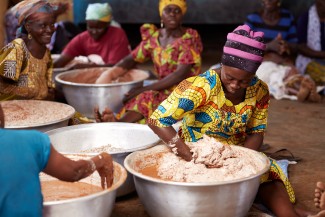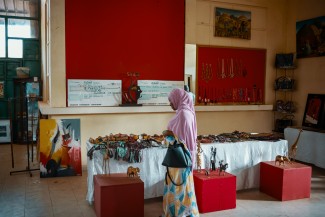Supply chains are vulnerable, but there is also promise in new sectors for least developed countries
As parts of the world begin to move out of the immediate health crisis of COVID-19, a major concern of least developed country (LDC) governments needs to be to create space for a strong investment climate, said an international investment policy expert.
“The only way really to create sustainable jobs and start recovery is for the private sector to ramp up. Creating the right conditions in the investment climate is what will allow for that to happen,” said the World Bank’s Ivan Nimac, Global Lead in Investment Policy and Promotion.
“Now is the time for LDC country governments to be making efforts to retain current investors, re-evaluate their foreign direct investment attraction strategy, reform impediments to their investment climate, and promote sectors where they have a clear value proposition and competitive advantage.”
Foreign Direct Investment (FDI) is an investment made by a firm or individual in one country into a business located in another country. According to the 2019 World Investment Report, FDI inflows to LDCs recovered from a four year low, increasing by 15% to US$24 billion, representing 1.8% of global FDI. However, other sources of capital such as remittances and Overseas Development Assistance (ODA) still remain substantially higher than FDI in LDCs.
“LDCs don’t get a lot of FDI because they tend to be agrarian-based economies with a limited formal economic space,” said Nimac, whose team recently published an analysis on investment climate policy responses to COVID-19.
The analysis describes how the pandemic has given the world a double economic shock.
“On the supply side, because of the impact of COVID-19 on labour and inputs, the private sector is struggling to produce goods. And then there’s a demand side shock because people are also not buying goods in these circumstances,” Nimac said.
“We’re also seeing an acceleration of previous tendencies that were making it more difficult for developing countries to become a part of global value chains and to leverage FDI for development.”
Exacerbating economic nationalism
The first thing that COVID has exposed, the analysis found, is the vulnerability of global value chains.
“As a result of economic globalisation, many multinational companies have production facilities that are stretched over a number of countries. Many of those facilities are in developing countries and LDCs. However, this model is very vulnerable to shocks – suddenly you can’t get inputs or there’s demand for your products and the whole supply chain collapses,” Nimac said.
The immediate reaction from multinational companies has been to work on ameliorating the risk within their supply chains. One option being explored is diversifying suppliers so that they’re not all in one country or region. Another option is to bring the value chain closer to home. However, this is seeing some countries putting in place protectionist measures, Nimac said.
“The abiding tendency has been to be very open to FDI because of the investments that it brings. But we’re now seeing increased regulation of some sectors, a broadening of the definition of national security that will lead to increased screening, as well as incentives for multinational corporations to do everything at home. This may make it impossible for LDCs to participate in some value chains, and it will make products and services more expensive,” he said.
It will be critical to limit such behaviour to sectors that are genuinely national security issues, he added.
“Let’s not get out of hand. We don’t want this to become a situation where everyone’s protecting themselves from everybody else. The resilience of supply chains should not come at the expense of efficiency.”
While COVID-19 is causing a major decline in sectors such as retail, automotive and tourism, other sectors are growing, Nimac said.
“We’re seeing opportunities in IT-related sectors, artificial intelligence, anything that helps everyone adapt to live in the new reality, such as digital technology, medical machinery. LDCs will face a bigger challenge to be competitive in these sectors, just by virtue of the fact that they are further behind the starting line than everybody else,” he said.
Retain, review, reform, promote
Nimac suggests four steps to help LDC governments take advantage of the opportunity COVID-19 provides for FDI.
The first and most urgent step is to focus efforts on retaining current investors.
“Some foreign investors may be contemplating shifting their business elsewhere because it’s all getting a bit too hard. Go and talk to your foreign investors, see what problems they’re having, see if you can resolve them, try your best to keep them in the country, because they’re important, they tend to be the ones that are creating high quality jobs,” Nimac said.
“The second step is to review your FDI strategy by looking at the sectors that have been attracting FDI up until now. Are you still competitive in those sectors, given what’s happened, or has COVID-19 led to a rising of other sectors that you might be competitive in? This will help you get specific with your promotion,” he said.
The third step is to double down on efforts to reform impediments to the investment climate.
“What hurdles are deterring investors? This could be unnecessary screening mechanisms, business registration processes, licensing processes, lack of protections for foreign investors… all the basic principles of good investment climate still apply,” Nimac said.
“And finally, if you’ve got space for it, continue with your attraction efforts to try and attract new FDI into sectors that you’re most competitive in.”
The international community has an important role to play in this process, from debt forgiveness to technical assistance.
“Technical assistance can help with analyses of benchmarking key sectors, figuring out opportunities, diagnosing what needs reform, building the capacity of investment promotion agencies and ensuring linkages between foreign investment and the domestic economy.”
Many countries have built their development model around the notion of globalization and becoming a part of the world economy. The pandemic is already stimulating a rethink of this model of development, Nimac said.
“It’s unclear whether this model of development is going to really be sustained, or whether a new model is going to emerge. A lot depends on the speed of the recovery.”
Header image - ©EIF
If you would like to reuse any material published here, please let us know by sending an email to EIF Communications: eifcommunications@wto.org.


